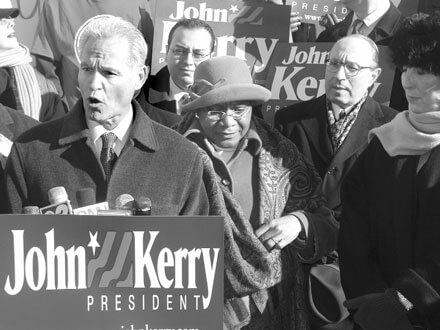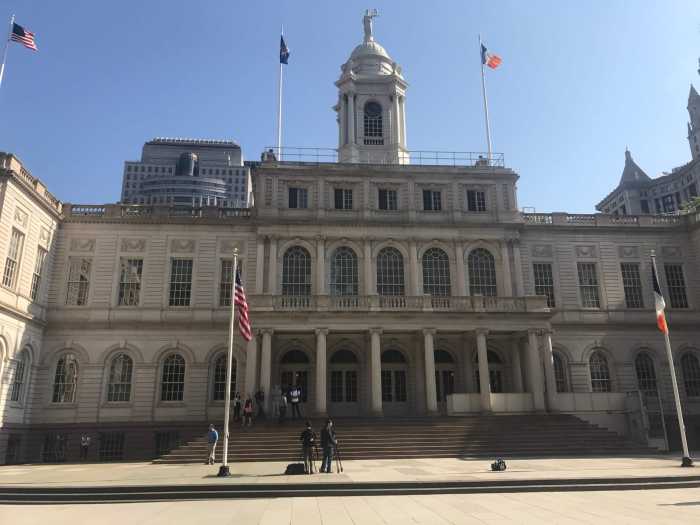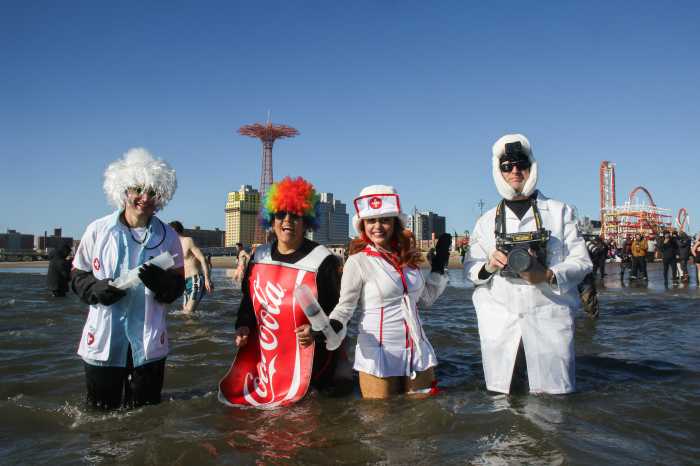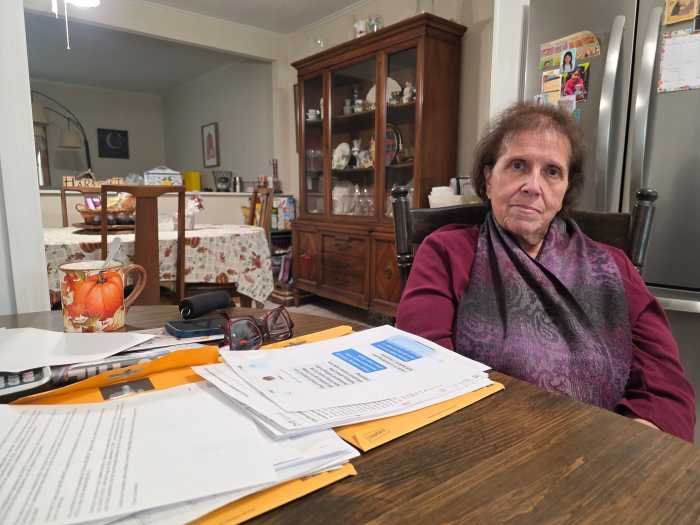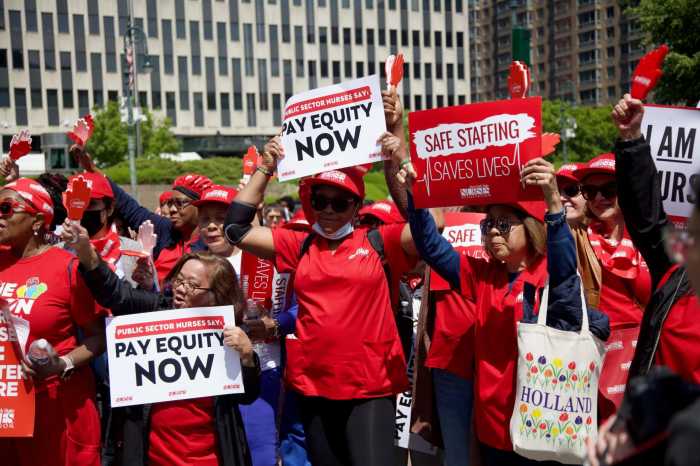Queer supporters cheer Iowa, address Dean’s stronger standing in community
A group of New Yorkers, including some LGBT leaders, who enthusiastically gathered for a press conference held the morning after Sen. John Kerry’s victory in the Iowa caucuses, said the main reason they support the Massachusetts Democrat is because they believe he has the best chance of beating Pres. George W. Bush.
About 30 Kerry supporters gathered on the steps of City Hall on January 20.
Kerry, who had been trailing in the polls for some time, turned his campaign around in the final days before the caucuses and won with 38 percent of the tally Monday night. John Edwards, the senator from North Carolina, received 32 percent, coming in a surprising second place. Dr. Howard Dean, the former Vermont governor, rounded out the top three with 18 percent, and Rep. Richard Gephardt ended his campaign after a disappointing fourth place finish with 11 percent.
Dennis Mehiel, Kerry’s New York State chair who ran unsuccessfully for lieutenant governor on a ticket with Carl McCall in 2002, led the rally, which he called the beginning of the New York campaign for Kerry.
“It’s the most diverse campaign in New York, we have people from all walks of life,” he said.
New Yorkers will vote in the primary on “Super Tuesday,” March 2, when nine other states, including California, also go to the polls. Mehiel said that the support for Kerry in the state extended beyond New York City.
“It’s possible that the first Tuesday in March will put this nomination away,” he said, though leading New York supporters of Dean, at a meeting on January 11 organized in part by the Gay and Lesbian Independent Democrats (GLID), said they view the Empire State as a firewall against any problems Dean might encounter in the early contests.
“Beating George Bush––that is what we all care about,” Manhattan Borough President C. Virginia Fields said outside City Hall. “These are not ordinary times. George Bush has done so much to take this country in the wrong direction.”
According to Fields, that direction leads to unilateralism and arrogance when what the nation needs is diplomacy.
“We need to win friends and not just destroy people who get in our way,” Fields said.
Kerry’s 18 years of experience on the Senate Foreign Relations Committee is an asset in the eyes of his supporters.
Mark Green, the former New York City public advocate who narrowly lost the 2001 mayoral election, said of Kerry Tuesday, “He is ready to be commander-in-chief tomorrow.”
Exhilarated by Kerry’s success the night before, Green called on all Democrats, all Gephardt supporters, and all people looking for change to join the Kerry campaign.
“The Kerry coalition intends to be more broad and more diverse,” he said.
Rep. Carolyn Maloney (D.–Manhattan) called Tuesday’s rally part of the “Real Deal Express,” referring to a Kerry campaign slogan.
“Last night John Kerry proved he is a fighter,” Maloney said. “He’s been fighting for everyday Americans and taking on special interests in Washington for his entire career.”
Brice Peyre, an out gay special assistant to Maloney, also attended the rally to show his support for Kerry.
“It is critical to get George Bush out of the White House and I am certain John Kerry can do that,” Peyre said
Kerry’s domestic policy, civil rights record, foreign policy experience, and military service are key reasons Peyre supports his candidacy. This package of qualifications, gives Kerry an edge in November, according to Peyre.
“Electability is absolutely critical,” he said. “There are many fine candidates, but Kerry is a much stronger general election candidate.”
For Peyre and other members of the LGBT community, electability is the quality that tipped the scale in favor of Kerry. But, perhaps sensitive to the fact that Dean has attracted very strong early support in the gay community––he has been endorsed not only by GLID, but also by the Stonewall Democrats, for example––Kerry supporters are quick to argue that their candidate’s LGBT record is very strong.
Judy Selby, who serves on the board of governors of the Human Rights Campaign (HRC) and on the board of directors of the Empire State Pride Agenda, called Kerry a “highly intelligent and thoughtful person” and an “early proponent of gay and lesbian rights.”
Kerry supports same-sex civil unions, but unlike his opponent, Dean, has never been in a position to sign a civil union law.
“I am confident he would have signed a civil union bill,” Selby said. “I wish he was supporting gay marriage, but I can’t hold it against him.”
None of the leading Democratic candidates support gay marriage, but all of them support some kind of civil union or domestic partner law.
Melissa Sklarz, GLID’s vice president, acknowledged that her support for Kerry has run against the tide.
“Most of my friends are going with Howard Dean,” she said. “Nine candidates, and now seven, are all very good with LGBT concerns. I love the idea of a Democratic war hero going up against Bush.”
Fred Hochberg, a former HRC co-chair and member of the Clinton administration and the new dean of the New School’s Milano Graduate School of Management and Urban Policy, was recently in Iowa campaigning for Kerry. Hochberg attended a rally Saturday night in Cedar Rapids for a “very large and active LGBT community.”
Hochberg said the results in Iowa were spectacular, but he didn’t sound surprised. Because of the old-fashioned politicking leading up to the Iowa caucuses, Iowans were able to meet Kerry first hand, he said.
“His personality and leadership comes through,” Hochberg said. “He has over 20 years of support for the gay community,”
In 1985, Kerry authored the Senate version of the Civil Rights Amendments Act of 1985, a comprehensive gay civil rights bill that aimed to eliminate discrimination in employment, housing, and credit. Since that time, HRC and other advocates have put forward a narrower bill, the Employment Non-Discrimination Act (ENDA), which is stalled in the Republican-controlled Congress.
Kerry, a Vietnam veteran, opposes the “Don’t Ask Don’t Tell” policy for gays in the military and has testified before the Senate Armed Services Committee in opposition to the ban. Kerry also supports ENDA, Peyre said.
Selby also spoke to Kerry’s record on gay and lesbian issues.
“He was one of 14 senators to oppose [the Defense of Marriage Act] and the only one who was up for reelection,” she said. DOMA, signed into law by President Bill Clinton in 1996, denies federal recognition to same-sex marriages granted in other jurisdictions, including any of the states, and allows other states to do the same.
With this kind of record on LGBT issues, why does it seem like support from the LGBT community has overwhelmingly gone to Dean over Kerry?
According to Hochberg, there are several reasons. Dean signed the nation’s only civil unions law in Vermont in 2000, which Hochberg argued looms larger in the public mind than a 1996 anti-DOMA vote. Dean is associated with an important step forward, while Kerry instead acted in opposition to a move backward, Hochberg said.
“John’s courageous stance on DOMA is less remembered,” he said.
But Hochberg also acknowledged that Dean may have outhustled Kerry with gay voters.
“Howard Dean worked particularly hard for LGBT support because he needed a base and John was already in the national spotlight,” Hochberg said. “John certainly has an equal record and certainly a longer record out of the spotlight on LGBT issues.”
For the Kerry supporters, the results in Iowa changed everything.
“It’s a new campaign as of today,” Peyre said. “The vast majority of LGBT voters have not made up their mind.”
Fields agrees.
“People seem to be looking at all the camps and not just one candidate,” she said. “It’s going to the polls that forces people to study the candidate.”
Sklarz said she will try to go to New Hampshire this weekend to help the Kerry effort. Peyre said he was definitely going and taking a gay friend. Hochberg will also head to New Hampshire and will continue his efforts to raise money and encourage support for Kerry in the gay community.

